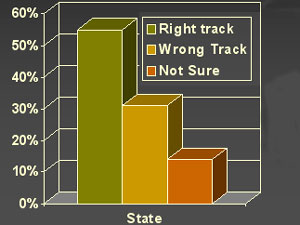Audio
Photos
More from MPR
Your Voice
| |||||||||||||||||||||||||||||||||||||||||||||||
Poll: Voters question school funding, want new standards
February 27, 2003
 |
| The majority of those responding to the poll approved of the direction of Minnesota's public education system. (Mason-Dixon Polling & Research) |
St. Paul, Minn. — Minnesota's K-12 education system now represents 43 percent of state spending. In many school districts, residents provide additional local tax support. But voters appear to have significant doubts about how education money is being used. In the latest MPR-Pioneer Press poll, 48 percent of the participants said the funds for public schools are not well spent. Thirty-eight percent said they are well spent, and 14 percent were undecided.
Sandy Peterson, 36, a single woman from Clear Lake with no children, is troubled by school districts' budget-cutting decisions.
 | |||
"I'm not exactly sure how they spend their money all the time, Peterson said. "But I think we could find ways of rearranging things so that we don't have to cut so many sports and that kind of thing for the kids."
The poll results show the concerns over education spending are about the same whether the respondents have children in school or not.
"It's disturbing," said Rep. Alice Seagren, R-Bloomington. "I think it should raise some red flags for us; we really need to be more cognizant of the feelings out there."
Seagren, chairwoman of the House K-12 Finance Committee, has also been hearing from many state residents who are questioning how schools spend their money. She said the referendums held in several school districts to raise local taxes have added to the questions.
"We've had some districts that have passed referendums, then it turns out they had big huge fund balances," Seagren said. "Maybe, they had told that to the public, and the public didn't catch it, or they didn't. And there's always this swirling around of uncertainty of how much money districts really have."
According to Seagren, Minnesota's education funding system breeds suspicion because it's too complex. She said Gov. Pawlenty's plan to restructure and simplify the system could help restore public trust.
Don May, president of the Minnesota School Boards Association, said the public still has a responsibility with school finances.
"I think the public should know more about it, May said. "I think they should take a responsibility to reach out and learn more about. Watch broadcast school board meetings. Read about it when it's in the paper. Ask questions." Voters appear to be questioning the state's graduation standards, known as the Profile of Learning. And most support the efforts underway in the Legislature to replace the show-what-you-know system with a new set of academic standards that focus on core subjects. Poll results show 65 percent support that move, 19 percent were opposed and 16 percent were undecided.
|
You hear these horror stories about kids that graduate from high school and can barely read, and things like that. I think those things need to be corrected earlier on.
- Neil Kingsley, poll respondent |
Neil Kingsley, 65, a retired federal employee from White Bear Lake, is the father of six children who attended public schools. He favors standards that measure student performance in the basics: reading, writing and math.
"Kids at certain levels, you need to have some kind of way of measuring are you getting through to them or not," Kingsley said. "You hear these horror stories about kids that graduate from high school and can barely read, and things like that. I think those things need to be corrected earlier on." Despite their questions about funding and the desire for new academic standards, most Minnesota voters still have faith in their public school system. The poll found 55 percent think the system is on the right track, 31 percent said it's on the wrong track and 14 percent were undecided.
Sen. Leroy Stumpf, DFL-Thief River Falls, chairman of the Minnesota Senate's education finance committee, said most criticisms are not based in reality.
"Minnesota has a high quality public education system," Stumpf said. "And many of our districts have a very high majority of our students going on to college education and do very, very well."
The Mason-Dixon Minnesota Poll surveyed 625 state voters Feb. 19 and 20. The margin of sampling error is plus- or minus-four percentage points.
|
News Headlines
|
Related Subjects
|

